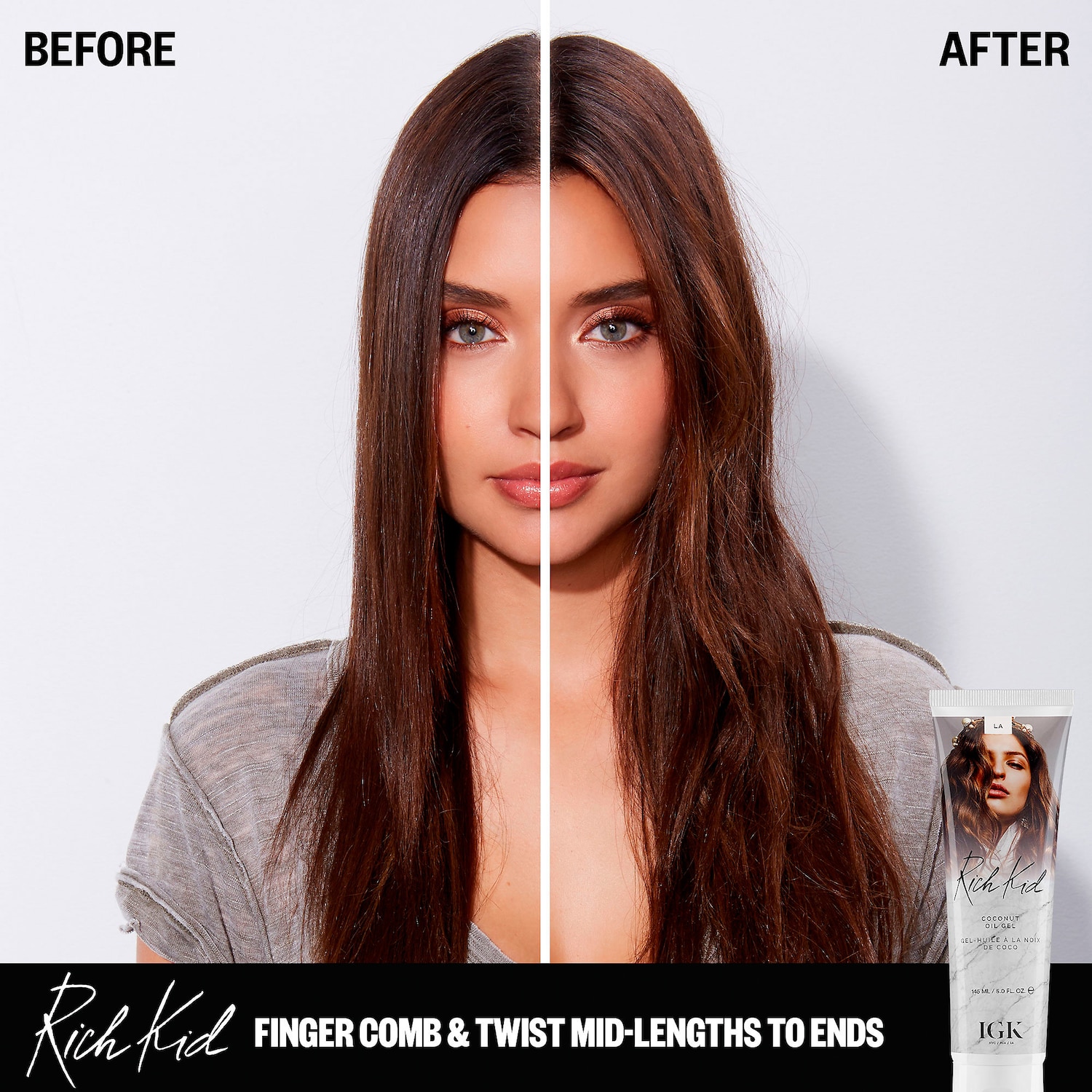Table Of Content

According to a study in 2010, coconut oil and anise spray was a more effective treatment for head lice than permethrin lotion. According to a review in the International Journal of Trichology, curly hair is more susceptible to breakage, and those with Afro hair may be prone to a more oily scalp but drier hair fiber. Applying coconut oil to children’s hair or scalp may relieve symptoms. One older study from 2013 found that coconut oil effectively treated atopic dermatitis in pediatric patients who used it for 8 weeks. Coconut oil’s principal fatty acid is lauric acid, and this has a high affinity for hair protein because of its low molecular weight and straight linear chain. This prevents the hair from repeatedly swelling and drying out, which results in hair damage.

What is the disadvantage of hair oiling?
For these reasons, coconut oil might make your hair look shinier, stronger, and longer. However, there’s not yet evidence that coconut oil can make your hair grow faster or longer. Coconut oil is generally considered safe to apply to your skin and hair (13).
The benefits of hair oiling:
And if you notice your scalp starts to feel irritated, flaky, or itchy—aka the opposite of how you want your scalp to feel after oiling—stop oiling ASAP and make an appointment with your dermatologist. If you’ve been searching for a tried-and-true ritual to achieve longer, luscious hair, may we suggest hair oiling? TBH, it's basically the oldest trick in the book—as far as my ancestors are concerned. Before including coconut oil in your haircare routine, you should assess your hair type, any allergies you might have, and what part of your hair health you want to treat.
Shop Our Favorite Coconut Oil Hair Products
The oil is derived from the raw, mature coconuts and is comprised of 100%, predominantly unsaturated fat. Coconut oil’s fatty acids (principally lauric acid) that can lend to hair health when employed correctly. “Coconut oil has benefits for all hair types, but is best used on dry, damaged, or color-treated hair to lock in moisture and prevent breakage,” says celebrity hairstylist Andrew Fitzsimons. I'll start this off by talking about some of the benefits coconut oil can offer the hair.
To get the most out of coconut oil, you’ll probably need to make it a regular part of your beauty regimen. When the cortex of your hair absorbs water and swells up, these scales are pushed outward so they stick up. This makes wet hair much easier to damage, especially when brushing or styling. This is because of subtle, structural changes that occur when it absorbs water.
It is beneficial to apply it to hair both before and after washing it. In addition, one of the reviewed studies determined that coconut oil was the only oil capable of reducing protein loss. This was true for undamaged and damaged hair when participants used the oil as a pre-wash and post-wash grooming product. There are a few different ways to oil your hair, depending on your hair type and goals.
Pumpkin Seed Oil for How: The Benefits and How It Works - Cosmopolitan
Pumpkin Seed Oil for How: The Benefits and How It Works.
Posted: Wed, 08 Nov 2023 08:00:00 GMT [source]
When to Avoid Coconut Oil for Hair
If you apply coconut oil to your scalp or hair and notice signs of an allergic reaction, stop using it and call your doctor immediately. Coconut oil is extracted from the coconut and retains many beneficial ingredients. With a mild and sweet taste, coconut oil has natural properties that are helpful for your skin. Dermatologists often recommend coconut oil for its moisturizing and possible anti-aging properties. The downside of using coconut oil in the hair is that, well, it's oily—so strands might be getting much-needed moisture, but they could feel weighed down in the process. The trick is to not use it too often and to thoroughly rinse it out after you've applied and let it work its magic.
Repairs Split Ends and Prevents Frizz
If the idea of applying oil to your hair makes you nervous, you can start small by using a tiny amount to tame frizz and applying it to the ends of your hair. "This will leave a polished, shiny look," says celebrity hairstylist Andrew Fitzsimons. He recommends using Alterna Haircare Caviar Anti-Aging Anti-Frizz Blowout Butter, which "tames frizz while protecting hair from heat-styling and humidity." With no additives, it’s safe for use around your face and for ingestion. If your baby or young child needs something for scalp care, coconut oil is a safe option.
What is Cedarwood Oil?
The 10 Best Hair Oils of 2024, Tested and Reviewed - PEOPLE
The 10 Best Hair Oils of 2024, Tested and Reviewed.
Posted: Tue, 19 Mar 2024 07:00:00 GMT [source]
It's not only a great option for cooking, but also has many purported health and beauty benefits. Just about anyone can use coconut oil to remove makeup—even those with sensitive skin. The important thing is to follow it up with an effective cleanser after the fact, says Rodney.
Though coconut oil does work in lieu of leave-in conditioner and is an effective detangler, rinsing it out eventually is a must, the better to avoid greasiness and buildup. Apply warm (aka liquified) oil to lengths post-shampoo, let sit for two hours, and wash again. The double-wash means that this process is best for those with thick, hearty strands.
Fortunately, there are ways to help protect your hair, and research has shown that coconut oil may have certain properties that can help keep your hair healthy. According to professionals, a 30-minute coconut oil mask can do wonders to restore hair moisture, while an overnight one can protect it for weeks on end. The oil helps fill the hair shaft, making dry and damaged hair look healthier.
The oil has anti-fungal benefits and, when topically applied, promotes a healthy scalp. Even though coconut oil doesn’t have a high nutrient content that provides specific benefits when applied topically, it does protect your scalp and hair. For the scalp, the barrier created by coconut oil blocks bacteria and irritants from causing more damage.
Some studies have even shown that coconut oil can be an effective agent in terms of increasing the strength of hair fibers, so regular use could yield less breakage and shedding. Saviano recommends using coconut oil before washing—so you can reap the benefits and still get all the residue out. More specifically, don't try it in the morning because it takes time to soak up, and your hair can end up looking greasy. "The best time to use coconut oil is at night, and it works best on dry hair," Saviano says.
Displayed ads do not constitute endorsement or recommendation by Wellness Mama. Katie Wells, CTNC, MCHC, Founder of Wellness Mama and Co-founder of Wellnesse, has a background in research, journalism, and nutrition. As a mom of six, she turned to research and took health into her own hands to find answers to her health problems. WellnessMama.com is the culmination of her thousands of hours of research and all posts are medically reviewed and verified by the Wellness Mama research team. Katie is also the author of the bestselling books The Wellness Mama Cookbook and The Wellness Mama 5-Step Lifestyle Detox. Blake Bakkila has been writing about everything from pop culture to lifestyle products for more than eight years.
If you have fine hair, keeping oil on your scalp and ends for an extended period of time can possibly weigh your hair down (more on this below, though). Coconut oil can be found in many types of hair products such as shampoos, conditioners, serums, and sprays. To find the right coconut oil hair product for you will likely require a bit of trial and error.

No comments:
Post a Comment